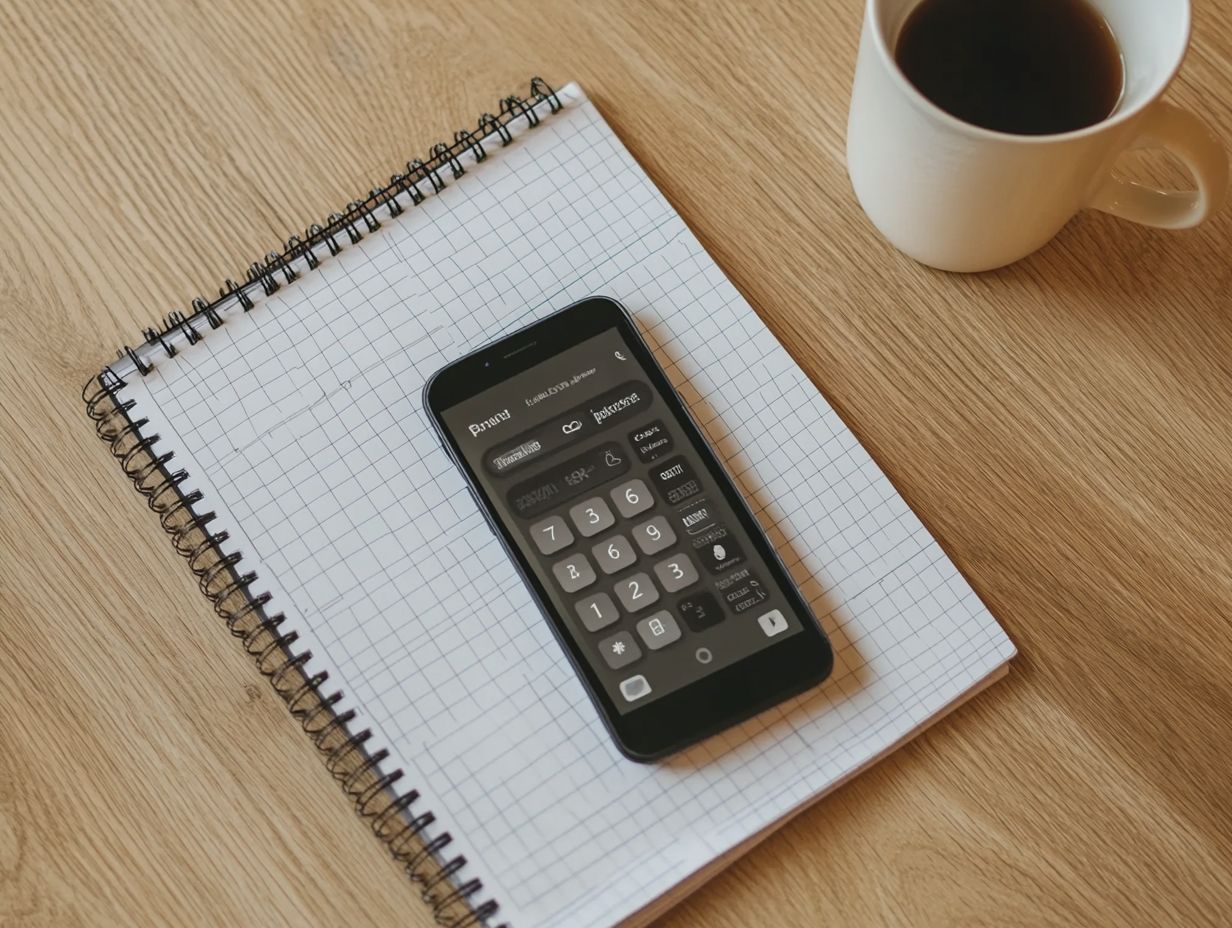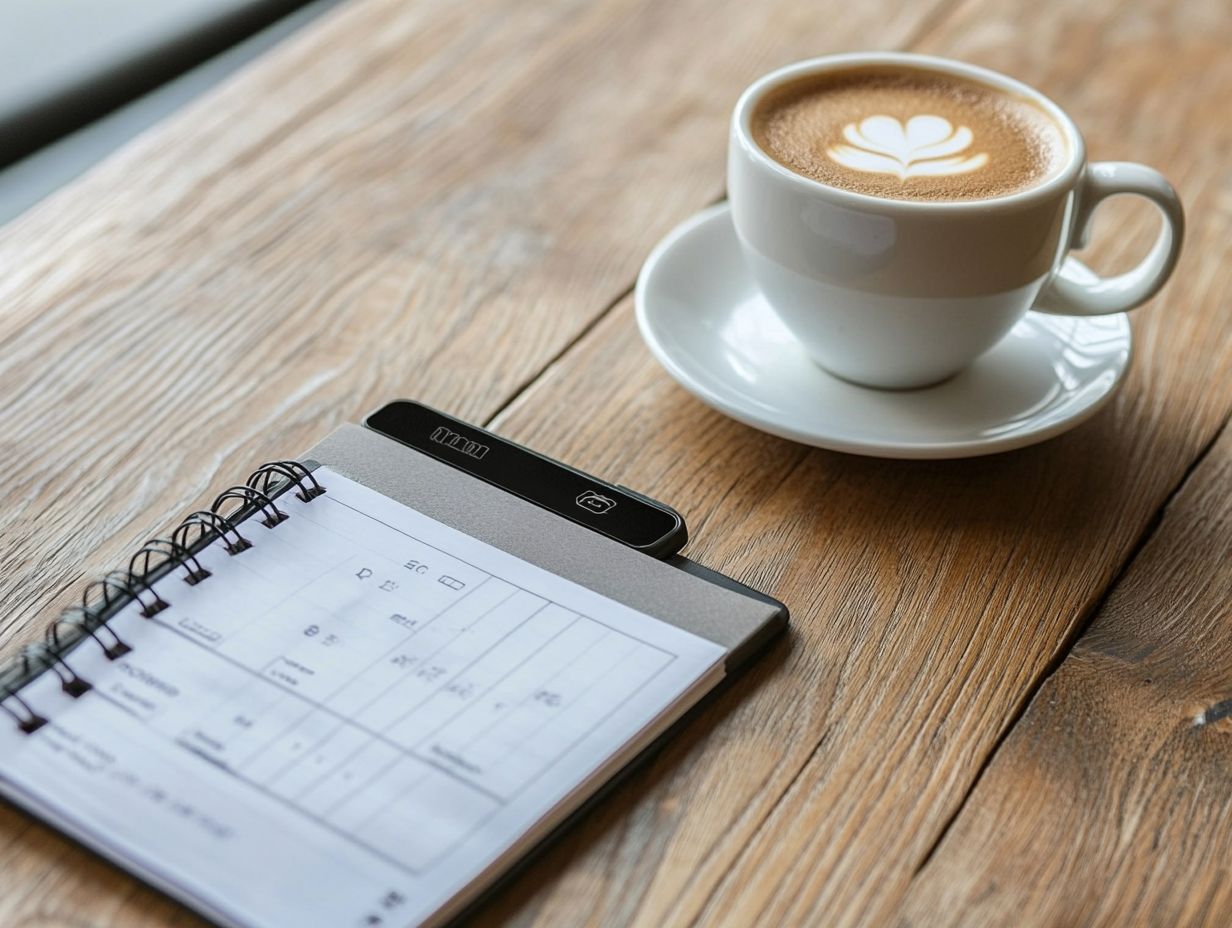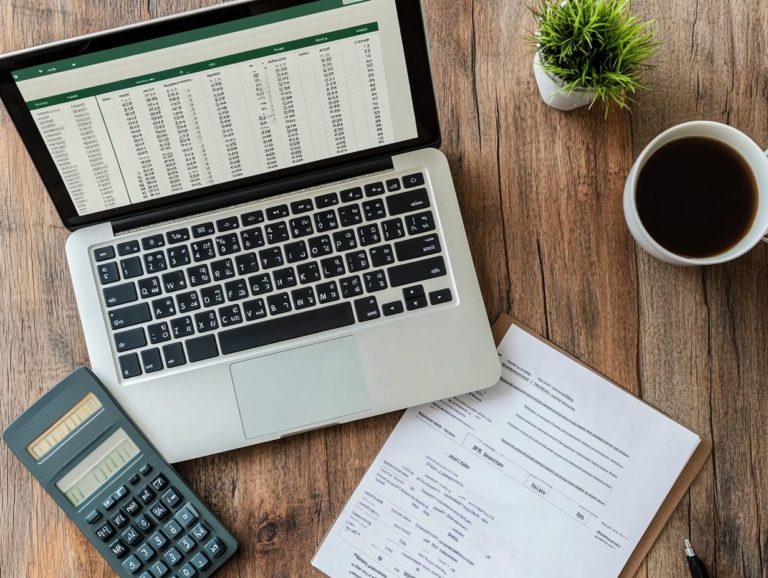What Are the Basics of Creating a Personal Budget?
Are you ready to take control of your finances? Mastering personal budgets is your key to financial freedom!
Grasping the nuances of personal budgets is vital for achieving both financial stability and peace of mind. Whether you re aiming to save for that dream vacation, tackle outstanding debt, or simply gain control over your spending habits, a well-structured budget can truly transform your financial landscape.
This guide delves into the essential elements of crafting a personal budget, offering step-by-step instructions, tools for tracking your expenses, and insightful tips for setting realistic financial goals. By the end, you ll possess the knowledge and confidence to manage your income effectively and adjust your budget as necessary, paving the way for a more secure financial future.
Contents
- Key Takeaways:
- Understanding Personal Budgets
- Creating a Personal Budget
- Tracking Expenses
- Setting Financial Goals
- Managing Income and Expenses
- Adjusting and Maintaining Your Budget
- Frequently Asked Questions
- What are the basics of creating a personal budget?
- Why is it important to create a personal budget?
- What are some steps to follow when creating a personal budget?
- How do I track my income and expenses for budgeting?
- What are some common budget categories to consider?
- What should I do if I have trouble sticking to my budget?
Key Takeaways:

- A personal budget is a crucial tool for managing finances and achieving financial goals.
- To create a personal budget, follow a step-by-step guide and track your expenses using tools and methods.
- Setting financial goals and managing income and expenses are key to maintaining a balanced budget.
Understanding Personal Budgets
Understanding personal budgets is essential for attaining financial health and managing your income with confidence. A personal budget acts as your roadmap, detailing how your income is allocated, categorizing expenses, and defining your financial goals.
This budgeting system enables you to track your spending and recognize your financial commitments. It helps you craft effective money-saving strategies, all of which contribute to building a strong savings.
By grasping the relationship between your fixed expenses (regular, set payments like rent) and variable expenses (fluctuating costs like groceries), you can make informed financial decisions that align seamlessly with both your short-term and long-term objectives.
Ensuring your emergency fund is well-prepared for the unexpected is equally important.
Definition and Importance
A personal budget is your financial roadmap, outlining expected income and thoughtfully allocating funds across various expenses. It s an essential tool for mastering money management.
This financial blueprint not only helps you monitor your spending habits but also plays a pivotal role in achieving specific financial goals, whether that s saving for a dream vacation or tackling debt.
By clearly mapping out where your money is coming from and where it needs to go, a personal budget grants you enhanced financial flexibility. It enables you to direct resources toward savings and essential expenditures while systematically addressing debt repayment, paving the way for a more secure financial future.
Embracing this practice can lead you to make more informed decisions and alleviate financial stress, enabling you to navigate your financial landscape with confidence.
Creating a Personal Budget
Creating a personal budget requires a thoughtful and systematic approach. Start by analyzing your net income. Then, define your expense categories clearly.
This foundation allows you to set realistic financial goals that will guide you throughout your budgeting journey.
Step-by-Step Guide
To successfully create a personal budget, begin by tracking your expenses and gaining a clear understanding of your financial situation in relation to your goals. This initial phase is vital for collecting comprehensive financial data that accurately reflects both your income and expenditures, which is essential when exploring what a personal budget is.
Once you have those key figures in place, categorize your expenses into fixed, variable, and discretionary segments. This categorization provides clarity and insight into your spending habits.
Next, consider utilizing budgeting tools such as apps or spreadsheets to streamline the process and visualize your budget effectively. Regularly reviewing and adjusting your budget as your financial commitments change whether from unexpected expenses or shifts in income will help ensure that your budget remains functional and aligned with your overall financial aspirations.
Don t wait! Start building your personal budget today and secure your financial future!
Tracking Expenses

Tracking expenses is a crucial component of effective budgeting. By monitoring your spending habits, you enable yourself to make informed financial decisions that align seamlessly with your budget.
This practice not only brings clarity to your financial situation but also enables you to take control of your financial future.
Tools and Methods for Tracking Spending
Utilizing the right budgeting tools and methods can significantly elevate your ability to track expenses and manage your finances with finesse.
By incorporating a variety of tools whether it’s sleek mobile apps, customizable spreadsheets, or even the good old-fashioned manual logs you can discover a method that aligns perfectly with your unique financial habits. Apps offer convenience and real-time tracking, making it easy to categorize your expenses; however, they may come with subscription fees or concerns about data privacy.
On the other hand, spreadsheets offer a level of customization and a hands-on experience, but they do require a bit of technical know-how.
Manual logs encourage discipline and a mindful approach to spending. Yet, they can be less efficient for those navigating a hectic lifestyle. To truly maximize your budgeting effectiveness, consider categorizing your expenses into fixed, variable, and discretionary categories. Discretionary expenses are non-essential costs, like entertainment or dining out. This will help you pinpoint areas ripe for potential savings and help you plan your finances better.
Setting Financial Goals
Setting financial goals is crucial for steering your budgeting efforts, ensuring that your personal budget harmonizes with both your immediate and long-term aspirations.
By establishing clear objectives, you can create a roadmap that not only directs your spending but also supports your vision for the future.
Identifying Short-term and Long-term Goals
Identifying your short-term and long-term financial goals is essential for effective budgeting. It allows you to prioritize your commitments and allocate your resources with precision.
Short-term goals usually encompass objectives you want to achieve within a year think saving for that dream vacation or building a robust emergency fund. On the other hand, long-term goals often span several years or even decades, such as saving for retirement or purchasing a home. Understanding these distinctions can profoundly impact your budgeting decisions and savings strategies.
For example, setting aside a portion of your monthly income for short-term aspirations keeps your motivation high, while directing a more substantial commitment toward long-term investments, like a retirement account, secures your future.
This balanced approach lets you savor immediate gratification while ensuring you don t lose sight of your future financial stability.
Managing Income and Expenses
Effectively managing your income and expenses is essential for achieving a balanced budget and attaining financial freedom.
This helps you make smarter choices with your money, enabling you to make informed decisions that support your goals.
Tips for Saving and Reducing Expenses

Act now to implement smart strategies to save money and reduce expenses, which are essential for maintaining a balanced budget and reaching your financial goals.
Whether it s reviewing your monthly subscriptions or cutting back on dining out, every small adjustment can lead to significant savings over time. Start by tracking your spending habits for a few weeks; this will help you pinpoint areas where you might be overspending.
With a clearer picture in mind, create a budget that allocates funds for both essential and discretionary expenses, while also setting aside money for savings.
Consider automating your savings each month to ensure consistency, and make it a point to reassess your budget periodically to accommodate any changes in income or expenses. Ultimately, a thoughtful approach will enable you to draw closer to your financial objectives.
Adjusting and Maintaining Your Budget
Adjusting and maintaining your budget is a continuous endeavor that guarantees your financial plan stays in sync with your evolving financial situation and aspirations. It s about keeping your strategy dynamic and responsive, ensuring it reflects your current needs and long-term objectives.
Troubleshooting and Making Changes
Take charge of your financial plan before it overwhelms you, particularly when unexpected expenses arise or your income fluctuates. You might find yourself grappling with common budgeting challenges, such as overspending in certain areas or struggling to prioritize savings effectively.
To tackle these obstacles, conduct regular reviews of your budget categories and spending patterns. This can unveil insights that guide timely adjustments. By recognizing the significance of making quick decisions, you position yourself to respond agilely to your financial landscape. This approach ensures you stay on track to achieve your goals while cultivating a resilient money management strategy.
Frequently Asked Questions
What are the basics of creating a personal budget?
The basics of creating a personal budget involve:
- Tracking your income and expenses,
- Setting financial goals,
- Making a plan to save and spend your money wisely.
Why is it important to create a personal budget?

Creating a personal budget allows you to control your finances, make informed decisions about your spending, and work towards achieving your financial goals.
What are some steps to follow when creating a personal budget?
Some steps to follow when creating a personal budget include:
- Identifying your income sources,
- Tracking your expenses,
- Setting financial goals,
- Creating a spending plan,
- Regularly reviewing and adjusting your budget.
How do I track my income and expenses for budgeting?
You can track your income and expenses by:
- Using a budgeting app or software,
- Keeping a record of your transactions in a notebook or spreadsheet,
- Saving your receipts and categorizing them.
What are some common budget categories to consider?
Some common budget categories to consider include:
- Housing expenses,
- Transportation costs,
- Food and groceries,
- Utilities,
- Savings,
- Debt payments,
- Entertainment.
What should I do if I have trouble sticking to my budget?
If you have trouble sticking to your budget, try to:
- Identify the areas where you are overspending and make adjustments,
- Use cash instead of cards,
- Set smaller goals,
- Seek help from a financial advisor.
Remember to be patient and persistent.
Start budgeting today for a more secure financial future!






